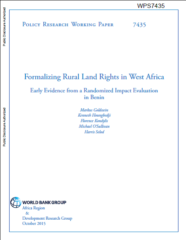
This paper presents early evidence from the first large-scale randomized-controlled trial of a land formalization program. The study examines the links between land demarcation and investment in rural Benin in light of a model of agricultural production under insecure tenure. The demarcation process involved communities in the mapping and attribution of land rights; cornerstones marked parcel boundaries and offered lasting landmarks. Consistent with the model, improved tenure security under demarcation induces a shift toward long-term investment on treated parcels.
This investment does not yet coincide with gains in agricultural productivity. The analysis also identifies significant gender-specific effects. Female-managed landholdings in treated villages are more likely to be left fallow—an important soil fertility investment. Women further respond to an exogenous tenure security change by moving production away from relatively secure, demarcated land and toward less secure land outside the village to guard those parcels.
